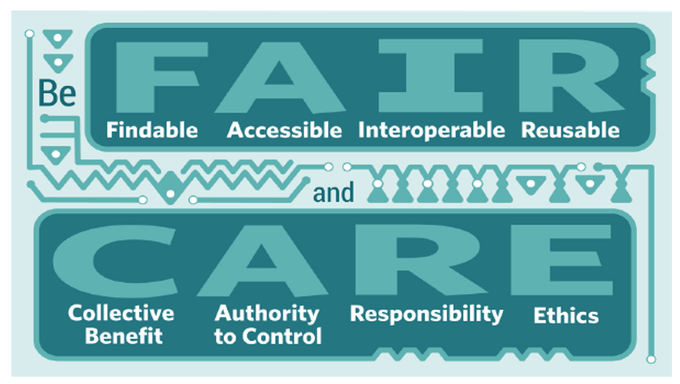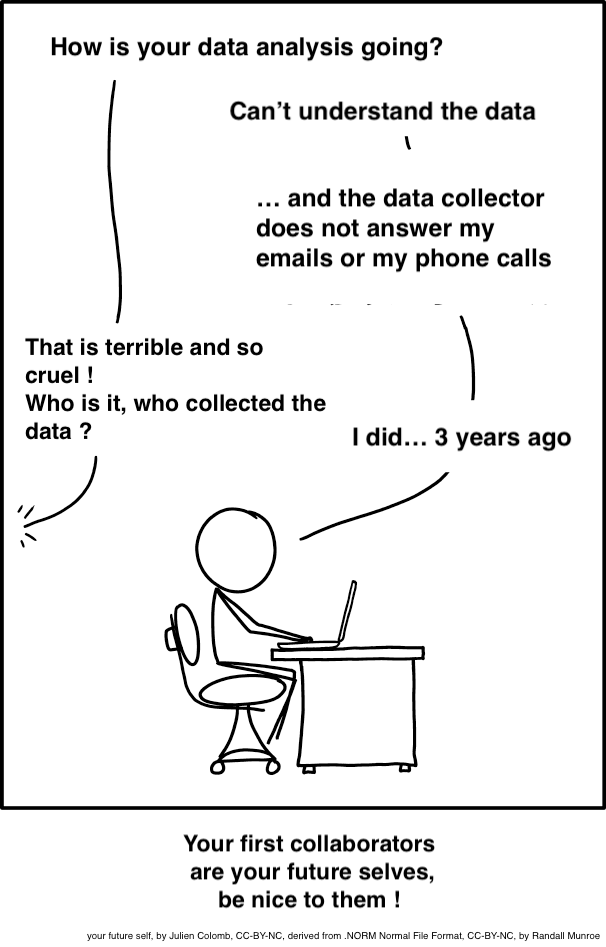
Research projects are usually composed of three or more smaller but highly complex project units that run in parallel generating multiple sets of data. Making these data available upon publication according to the four foundational principles – Findability, Accessibility, Interoperability, and Reusability (FAIR principles) is a standard requirement and established part of there research workflow. This course gives an introduction to Research Data Management (RDM), the contextualisation of datasets by adding relevant metadata, theory and practical application of FAIR and CARE (people & purpose) principles as well as an overview of appropriate research data repositories along with legal and ethical aspects to take into consideration in the process.
FAIR Principles

The ‘FAIR Guiding Principles for scientific data management and stewardship’ provide guidelines to improve the Findability, Accessibility, Interoperability, and Reuse of digital assets by means of machine-actionability.
CARE Principles

The ‘CARE Principles for Indigenous Data Governance’ complement the existing FAIR principles by being people and purpose-oriented, reflecting the crucial role of data in advancing Indigenous innovation and self-determination.
Modules
I) Introduction and the Research Data management Plan and (RDM)
- The art of the spreadsheet: csv, tidy data, interoperability, machine and human readability
- Data inventory, folder organisation, file names, backups
- Open & FAIR data: repositories, licences, FAIR principles
- the CARE principles #BeFAIRandCARE
- From experimental design to publication >> the Research (Data) Management Plan
II) Reproducibility and data analysis
- Metadata: experiment and sample wide, content, timing
- Version control & helper tools (git, Rstudio, Github)
- Combine data from different sources
- Data modification, analysis documentation with MS Excel, R and Rstudio
- Make your analysis human readable – code commenting: conventions and examples, dplyr package
III) Design Thinking and agile methods, Data visualization
- Digital Tools for Science Project Management
- Agile Kanban for Science
- The Project Design Canvas
- Project Monitoring & Evaluation
- Turn your datasets into graphs and images

Reading Suggestions & Resources
Gregory K, Khalsa SJ, Michener WK, Psomopoulos FE, de Waard A, Wu M (2018) Eleven quick tips for finding research data. PLoS Comput Biol 14(4): e1006038. doi.org/10.1371/journal.pcbi.1006038
Wilkinson, MD. et al., (Dec 2016), The FAIR Guiding Principles for scientific data management and stewardship. nature.com/scientificdata
The Data FAIRport initiative is an open movement started as the practical follow up of a Lorentz Workshop in Leiden, The Netherlands, January 2014, named: Jointly designing a Data FAIRport. Their vision is to join and support existing communities that try to realise and enable a situation where valuable scientific data is ‘FAIR’ in the sense of being Findable, Accessible, Interoperable and Reusable. | datafairport.org
DMPonline helps you to create, review, and share data management plans that meet institutional and funder requirements. It is provided by the Digital Curation Centre (DCC).| dmponline.dcc.ac.uk
A deep dive into FAIR data: https://howtofair.dk/ – Brought to you by the Danish National Forum for Research Data Management, with support from the Danish e-Infrastructure Cooperation (DeiC).

